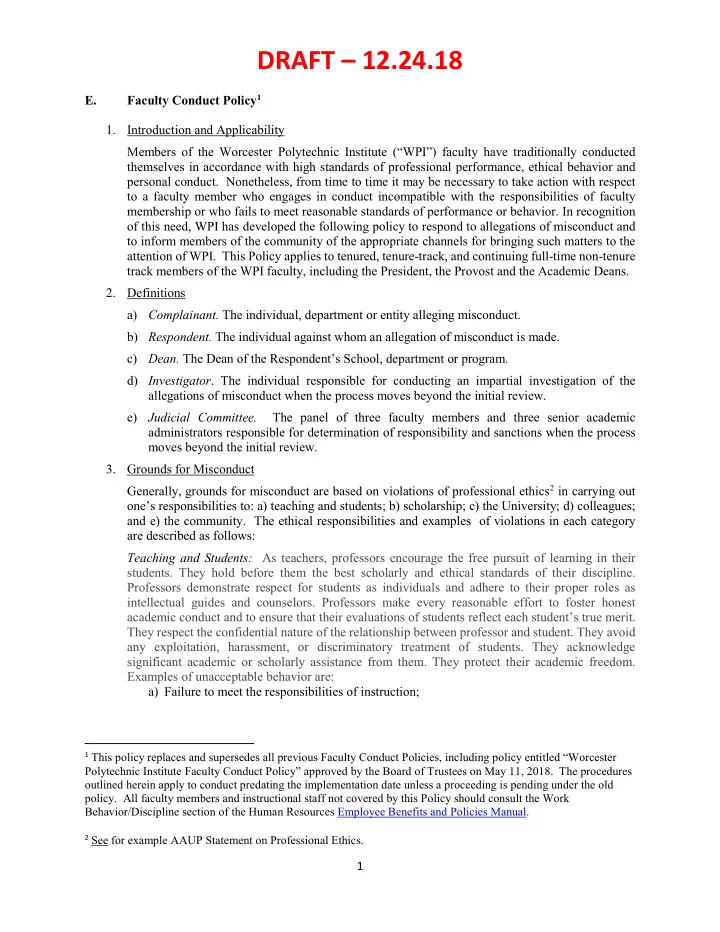

DRAFT – 12.24.18 Faculty Conduct Policy 1 E. 1. Introduction and Applicability Members of the Worcester Polytechnic Institute (“WPI”) faculty have traditionally conducted themselves in accordance with high standards of professional performance, ethical behavior and personal conduct. Nonetheless, from time to time it may be necessary to take action with respect to a faculty member who engages in conduct incompatible with the responsibilities of faculty membership or who fails to meet reasonable standards of performance or behavior. In recognition of this need, WPI has developed the following policy to respond to allegations of misconduct and to inform members of the community of the appropriate channels for bringing such matters to the attention of WPI. This Policy applies to tenured, tenure-track, and continuing full-time non-tenure track members of the WPI faculty, including the President, the Provost and the Academic Deans. 2. Definitions a) Complainant. The individual, department or entity alleging misconduct. b) Respondent. The individual against whom an allegation of misconduct is made. c) Dean. The Dean of the Respondent’s School, department or program. d) Investigator . The individual responsible for conducting an impartial investigation of the allegations of misconduct when the process moves beyond the initial review. e) Judicial Committee. The panel of three faculty members and three senior academic administrators responsible for determination of responsibility and sanctions when the process moves beyond the initial review. 3. Grounds for Misconduct Generally, grounds for misconduct are based on violations of professional ethics 2 in carrying out one’s responsibilities to: a) teaching and students; b) scholarship; c) the University; d) colleagues; and e) the community. The ethical responsibilities and examples of violations in each category are described as follows: Teaching and Students: As teachers, professors encourage the free pursuit of learning in their students. They hold before them the best scholarly and ethical standards of their discipline. Professors demonstrate respect for students as individuals and adhere to their proper roles as intellectual guides and counselors. Professors make every reasonable effort to foster honest academic conduct and to ensure that their evaluations of students reflect each student’s true merit. They respect the confidential nature of the relationship between professor and student. They avoid any exploitation, harassment, or discriminatory treatment of students. They acknowledge significant academic or scholarly assistance from them. They protect their academic freedom. Examples of unacceptable behavior are: a) Failure to meet the responsibilities of instruction; 1 This policy replaces and supersedes all previous Faculty Conduct Policies, including policy entitled “Worcester Polytechnic Institute Faculty Conduct Policy” approved by the Board of Trustees on May 11, 2018. The procedures outlined herein apply to conduct predating the implementation date unless a proceeding is pending under the old policy. All faculty members and instructional staff not covered by this Policy should consult the Work Behavior/Discipline section of the Human Resources Employee Benefits and Policies Manual. 2 See for example AAUP Statement on Professional Ethics. 1
DRAFT – 12.24.18 b) Discrimination, including harassment against a student on grounds described in https://www.wpi.edu/about/policies/equal-opportunity-anti-discrimination-harassment or any other arbitrary or personal reason, including disability; c) Violation of University instructional policies; d) Use of position of powers to coerce the judgment or the conscience of a student or to cause harm to a student for arbitrary or personal reasons; e) Participating or deliberately abetting disruption, interference, or intimidation in the classroom. Scholarship: Professors, guided by a deep conviction of the worth and dignity of the advancement of knowledge, recognize the special responsibilities placed upon them. Their primary responsibility to their subject is to seek and to state the truth as they see it. To this end professors devote their energies to developing and improving their scholarly competence. They accept the obligation to exercise critical self-discipline and judgment in using, extending, and transmitting knowledge. They practice intellectual honesty. Although professors may follow subsidiary interests, these interests must never seriously hamper or compromise their freedom of inquiry. This Policy covers misconduct related to scholarship only if it is not covered by the Research misconduct policy https://www.wpi.edu/sites/default/files/docs/About- WPI/Policies/Research_Misconduct_Policy.pdf. The University: As members of an academic institution, professors seek above all to be effective teachers and scholars. Although professors observe the stated regulations of the institution, provided the regulations do not contravene academic freedom, they maintain their right to criticize and seek revision. Professors give due regard to their paramount responsibilities within their institution in determining the amount and character of work done outside it. When considering the interruption or termination of their service, professors recognize the effect of their decision upon the program of the institution and give due notice of their intentions. Examples of unacceptable behavior are: a) Incitement of others to disobey University rules when such incitement constitutes a clear and present danger that violence or abuse against persons or property will occur; b) Unauthorized use of University resources or facilities on a significant scale for personal, commercial, political, or religious purposes; c) Forcible detention, threats of physical harm to, or harassment of another member of the University community, that interferes with that person’s performance of University activities; d) Significant violations of institutional policies; e) Discrimination, including harassment against any employee, contractor, intern on grounds described in https://www.wpi.edu/about/policies/equal-opportunity-anti-discrimination- harassment or any other arbitrary or personal reason, including disability. Colleagues: As colleagues, professors have obligations that derive from common membership in the community of scholars. Professors do not discriminate against or harass colleagues. They respect and defend the free inquiry of associates, even when it leads to findings and conclusions that differ from their own. Professors acknowledge academic debt and strive to be objective in their professional judgment of colleagues. Professors accept their share of faculty responsibilities for the governance of their institution. Examples of unacceptable behavior are: a) Making evaluations of the professional competence of faculty members by criteria not directly reflective of professional performance; 2
Recommend
More recommend